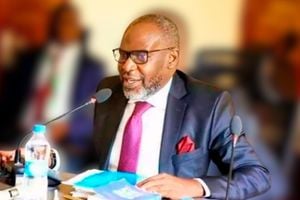Happening Now: Rigathi Gachagua impeachment case
Meet the man who got women a seat at the elders' land table

Shadrack Omondi during the interview in Machakos town on October 25, 2024. He has dedicated his life to promoting women's human dignity by advancing their access to, use of, and control over land.
What you need to know:
- Shadrack Omondi, a sociologist turned advocate, has dedicated his life to securing women's land rights.
- Through his leadership at the Resource Conflict Institute and now Landesa, he has helped champion groundbreaking legislation that guarantees women's land rights.
- Despite cultural resistance, he continues to work at the grassroots level, engaging with elders and community leaders to transform deeply held beliefs and ensure women can actually exercise their legal rights to land ownership and management.
Shadrack Omondi stands at the cusp of change. He has dedicated his life to promoting women's human dignity by advancing their access to, use of, and control over land in a country where their land rights are stifled by the heavy weight of culture.
In 2005, soon after he completed his undergraduate education in Sociology at Egerton University, a chance encounter with a researcher investigating land laws and policies in Kenya would forever alter his path.
He was invited to serve as a research assistant, and through this research, he discovered a significant issue: women were heavily excluded from land and property.
The revelation stirred something deep within Shadrack, transforming from a mere observation into a passionate calling to promote gender-sensitive land laws and policies.
Equal recognition
Between February 2011 and December 2020, Shadrack served as the executive director of the Resource Conflict Institute, a regional policy research and advocacy non-governmental organisation registered in Kenya.
Under this entity, he, along with various organisations, lobbied for the creation of the inclusive Land Act (2012), Land Registration Act (2012), and Community Land Act (2016).
Article 5(2) of the Land Act guarantees “equal recognition and enforcement of land rights arising under all tenure systems and non-discrimination in ownership of, and access to land under all tenure systems.”
While Section 28 of the Land Registration Act, 2012, provides for overriding interests, including spousal rights over matrimonial property, trusts (including customary trusts), and rights of way, water, and profits existing at the time of first registration under the Act.
Fida-Kenya explains that this means that whether or not a wife's name appears on a certificate of registration, her rights as a wife will be considered in any dealings regarding the land in question. Furthermore, if women need to access water from a source within the registered land, their interests must be protected.
Additionally, the Community Land Act (2016) ensures equal benefits from community land: women have the right to enjoy full and equal rights to use and access community land, except for legally divorced women who have remarried or women who have remarried after the death of a spouse.
“If you consider how land has traditionally been managed, women have not had a voice in terms of decision-making related to ownership, access, or even use of the land. However, now in the pastoralist communities of Kajiado, Narok, and Laikipia, women can secure land,” he says.
Despite these laws, significant challenges remain.
“In the local rural context, cultural norms are very prominent. This is one of the biggest challenges we face in advancing women's land rights,” he points out.
“You speak to duty bearers, and they tell you, 'It's easy to say this in workshops. But when I return and advocate for this, I will be seen as an outcast. They will believe that I am challenging the culture and working to undermine what our forefathers bequeathed to us.'”
Together with grassroots partners, they continue to educate elders to deconstruct the inhibiting beliefs and help them understand that it is acceptable for wives and daughters to own land.
Regarding the representation of women in land governance processes, Shadrack observes that there has been progress.
“We now have many women serving as directors within the Ministry of Lands and similar positions,” he states.
“Traditionally, women were not allowed to sit with elders to discuss land matters. However, we now have legislation, such as the Community Land Act, which provides for a gender-responsive land management committee, allowing men to make decisions regarding the day-to-day use of community land, while also ensuring that women have a voice in community assemblies on voting. Change is occurring.”
Bridge the gap
Shadrack is currently the Kenya Programme Director for Landesa, an international organisation dedicated to advancing gender-sensitive land laws and policies. He is at the forefront of the Stand for Her Land Kenya campaign, which aims to eliminate all forms of discrimination against women and girls in terms of access to, use of, control over, and ownership of land.
“Stand for Her Land is a rallying call to bridge the gap between implementation and reality,” he explains.
“It addresses the question of how we can ensure that laws and policies are implemented effectively.”
Through the campaign, Landesa aims to collaborate with grassroots women and organisations to raise awareness of existing laws and policies.
It also aims to change conservative attitudes, behaviours, and beliefs that hinder women’s land rights.
“You see norms that cannot be addressed in workshops or in urban centres. These are issues that require sitting down with the people. This campaign gives us an opportunity to work with women leaders and youth to engage with elders and opinion leaders, deconstructing the barriers that prevent women from realising their land rights.”
Shadrack envisions a country where “a woman is recognised as a person with equal rights to access, use, and manage land and associated resources.”





